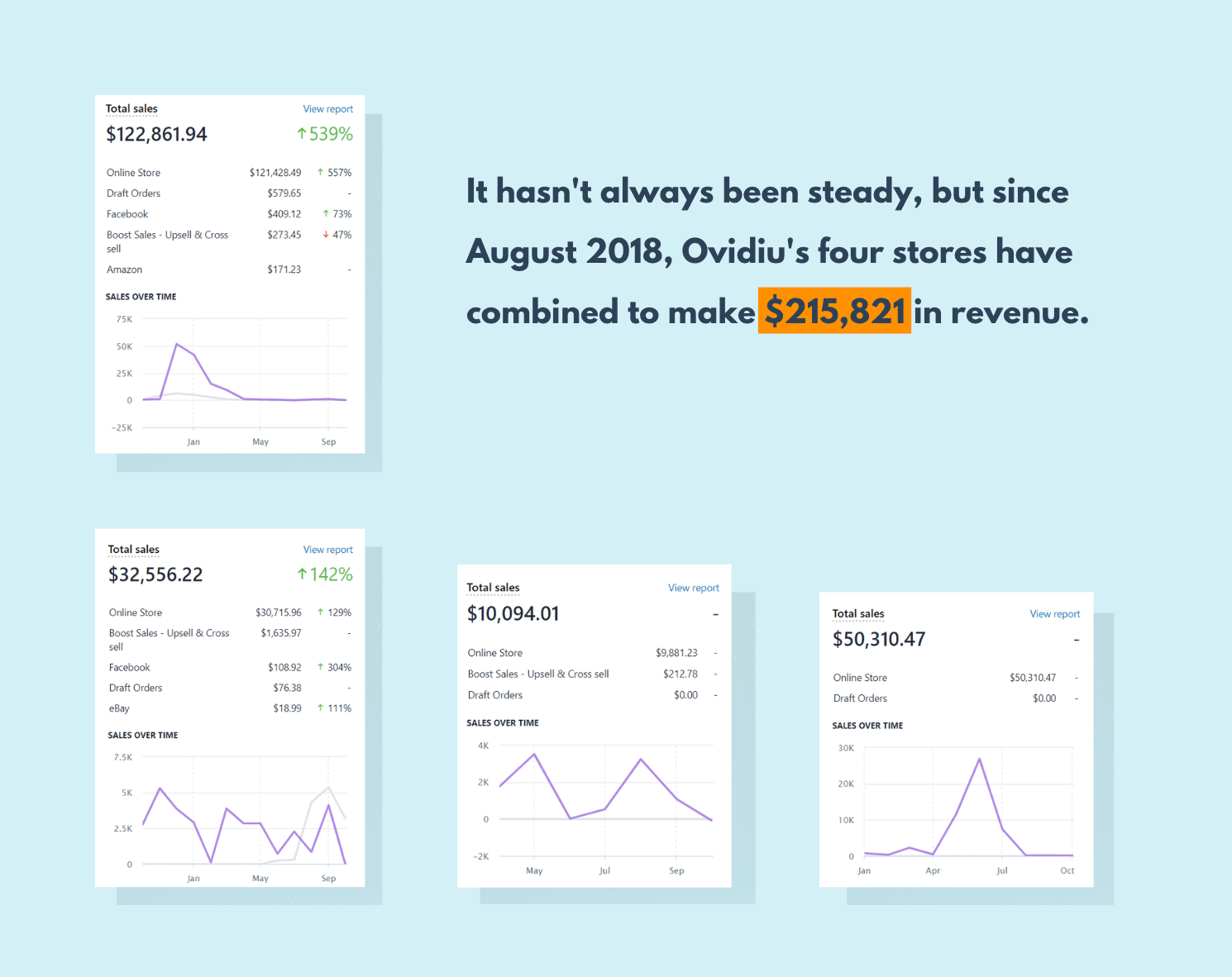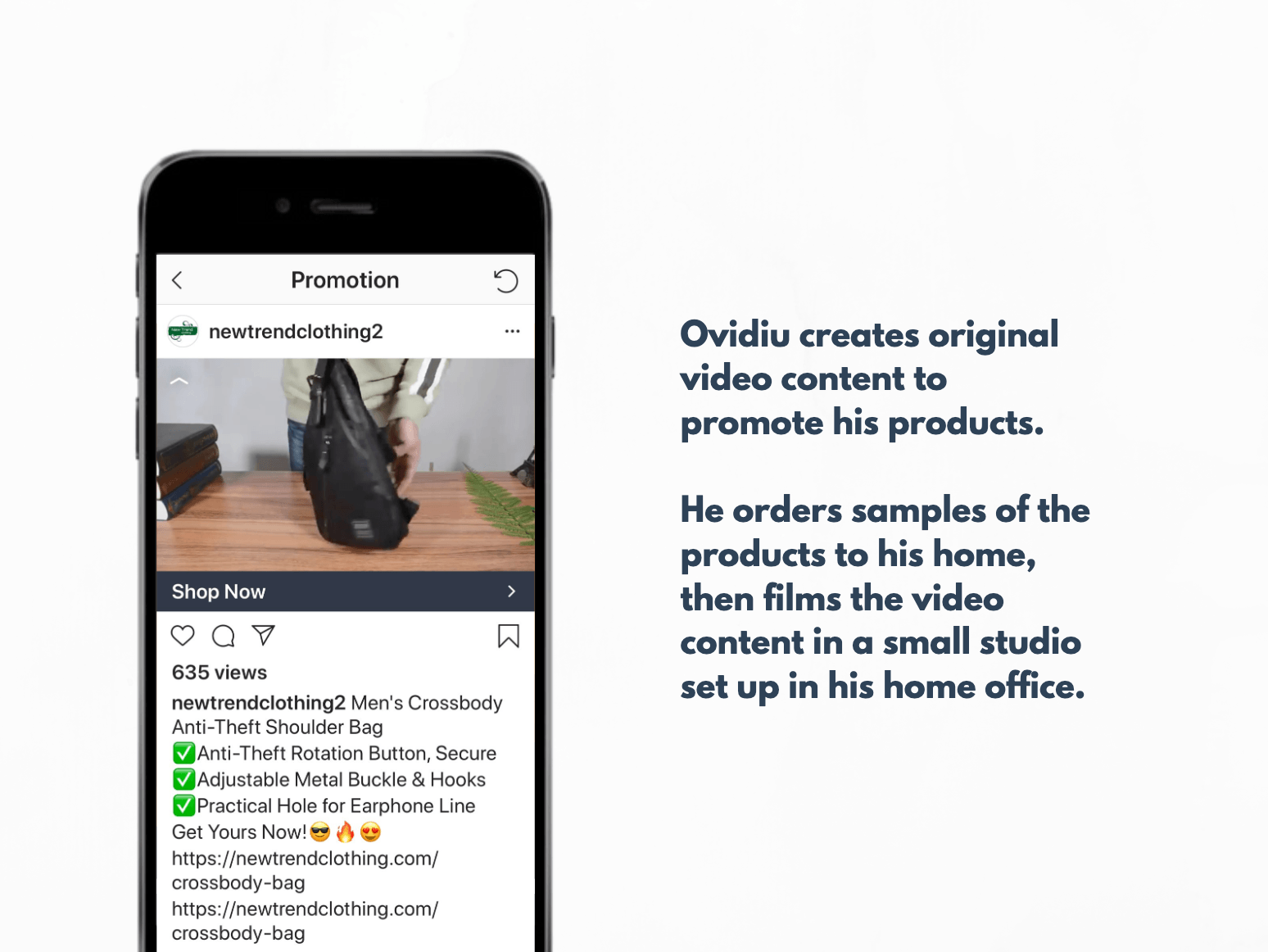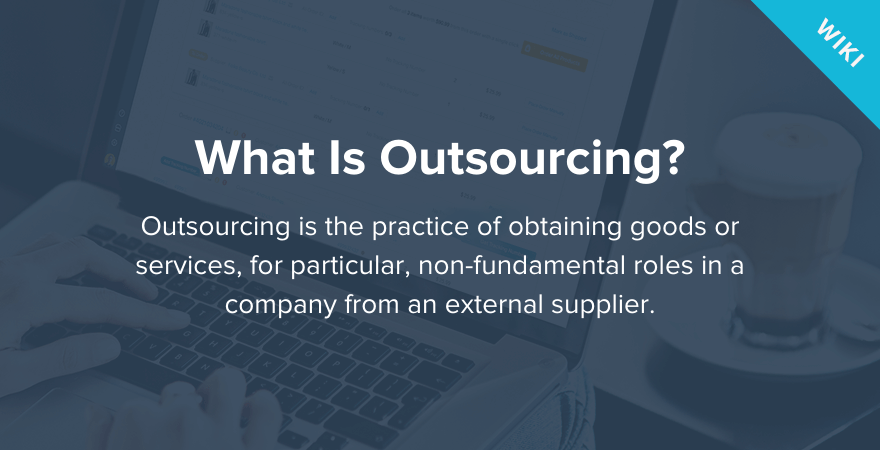It’s midnight in Anchorage Alaska, and Ovidiu Sofron is hiding in his car. He snuck out of the house to talk to me over the phone, hoping to avoid waking his three-year-old son.
Despite the late hour, Ovidiu is wide awake. He’s positively chirpy, chatting and making jokes, pausing our conversation to flip his phone camera over and show me the sun that’s still shining in the middle of the night.
The whole situation feels a little strange, but then Ovidiu is a bit of an unconventional guy himself.
He’s a late-comer to entrepreneurship, having started his first business at 37 only after losing his high-paying job in finance. Now he’s a stay-at-home Dad by day, and a part-time ecommerce entrepreneur by night.
While he spends the mornings handling Dad duties, in the evenings he transforms. Late at night while everyone in the house sleeps, Ovidiu takes on the role of entrepreneur, leading a team of five assistants who manage his four ecommerce stores.
That night, from the front seat of the car parked out the front of his house, he tells me all about it.

Don’t wait for someone else to do it. Hire yourself and start calling the shots.
Get Started FreeFrom a Six-Figure Salary to Dropshipping
For Ovidiu, turning into an entrepreneur was unexpected. With a certified accounting qualification and MBA under his belt, he had set himself up for a predictably comfortable career.
But then in July 2018, he lost his job.
Working hours turned into days spent at home. “I was sitting at home like, ‘What am I gonna do?’” he says.
One day, while flicking through his phone with his toddler asleep in the other room, he came across the concept of dropshipping.
What is Dropshipping?Dropshipping is a business model that allows entrepreneurs to run an ecommerce store without holding inventory. It works by connecting store owners to suppliers who make products. A store owner like Ovidiu will use Oberlo to import products from different suppliers into his store, then his job is to advertise them to customers. When a customer buys a product from Ovidiu’s store, he’ll purchase the product from his supplier, who will ship it directly to his customer. Which means no leftover stock or warehousing costs for Ovidiu, ever. |
He was curious. “I was like, ‘Well, what’s the worst thing that’s going to happen?’”
In August 2018 he went live with his first store, Northern Bears, selling snoring sleeping aids, pet toys, jewelry, and other household items.
By now he’d spent hours working on his store, and was excited to show his wife. “I showed her and she said, ‘Well, those products suck. You’re not going to make any sales.’”
And with that challenge, he knew he wasn’t going to give up until he made this thing work.
“After my wife told me that I actually became more competitive,” he says, laughing.
He’s since launched three more stores, focused around fishing, women’s fashion, and viking products. Across the three, he’s generated more than $200,000 in revenue.

Ovidiu’s Outsourcing Model
Growing his businesses was slow and painful. “I failed up until about November of 2018. So August, September, October, November, I failed.”
From the beginning, Ovidiu approached his ecommerce businesses the same way he approached his finance jobs.
“I come from a very logical background,” he says. “I’ve been in management for eight years, and I did operations and accounting for six years. So I understand the operations of how to run the store.”
Unlike many other entrepreneurs who maintain control over all parts of their business, Ovidiu operates his collection of businesses like the captain of a ship. He’s a master of delegation and relies on a team of virtual assistants to complete tasks he admits he’s got no talents for.
“While I don’t understand how to put an ad together, I understand what products can be successful. So I work with a team that knows how to do the ads,” he says. “I have somebody to help me with Facebook ads, Instagram ads, and Google Ads.”

Breaking Down the Outsourcing Strategy

Ovidiu currently has five core members of his business team, who work across all four of his brands. These assistants are in charge of:
- Facebook + Instagram ads
- Website management
- Video editing
- Email campaigns
- Product research
- Customer service
- Product description writing
- Social media content creation
- Email template designing
- Bookkeeping
These five team members take on a huge chunk of the work involved with keeping each of the businesses running smoothly, leaving Ovidiu time and brain space to focus on long-term strategy, and (his speciality) managing the financials of the business.
While it might sound like a dream come true to hand off the bulk of your work to someone else, there are complexities to this kind of approach. Let’s take a closer look.
Cons of Outsourcing
The biggest con? Margins, margins, margins, baby. With the overhead costs of paying staff, your profit margins will be significantly impacted.
Ovidiu pays between $800-$1,200 per month in wages for his team members. Based on the average profit margin of 10-20%, he needs to make at least $9,000 per month to start generating profit.
If you’re consistently making around $10,000 in revenue per month, it makes sense to start outsourcing. Fail to outsource part of your work as your business grows and you’ll quickly find yourself unable to find the time to complete all the tasks you need to.
Or worse, you’ll burn out and have to quit.
With a team of people involved, you’ll also need to be comfortable flexing your skills as a manager. You’ll need to be efficient at delegating tasks (avoiding them temptation to do everything yourself), as well as feel comfortable giving feedback and prepared to have some difficult conversations if things aren’t going well.
“I have fired a few VAs and my style is different than most,” Ovidiu says. “I was honest with my expectations before hand and I was honest that the expectations weren’t met. It went pretty well, they understood.”
Pros of Outsourcing
Yes, you are very clever, are great at cooking spaghetti bolognese, and my god, that outfit looks good on you. But, if you really think about it, you’d have to admit it: you’re not good at everything.
Far from being a blow to your ego, you should embrace your weaknesses as opportunities to seek help from other people. Outsourcing certain tasks can allow you to focus on the elements of the business that you’re best at.
Ovidiu’s method of outsourcing has allowed him to shed the responsibility of creating social media and advertising content.
“I’m not very creative,” he admits.
Instead he shifts the responsibility to his assistants, who can complete creative tasks with a whole lot less hair-pulling.

Dad by Day, Entrepreneur by Night
Before he lost his job, Ovidiu was living the corporate life. Every weekday (and sometimes on Saturdays), he’d leave the house at 8:30 a.m., returning at 7 p.m. That meant there were only a few precious hours per week he could spend with his young family.
“One of those things that my wife and I always talk about are the stories of what are people most regretful about,” he says. “One of the things you hear about is, ‘Hey, I became successful, but I had to put in 100 hours at the office.’”
So when he lost his job, it was a gift wrapped up in what felt like a failure. He’s now able to run his businesses from home, allowing him to spend the days playing and reading books with his three year old son.
He’s scheduled his time to fit perfectly around maximizing time with his son and wife, while allowing him to dedicate around 15 hours per week to his businesses.
“One of the best, joyous things that I have, is that I wake up with him every morning,” he says. “I cook him breakfast, there’s no nanny, I don’t have to drop him off at daycare. He’s grown up with me, I’ve seen all his progression. I’ve watched him develop, learning to speak and everything.”
His wife returns home from the office at 1 p.m., and the family spends the afternoon and evening together. After their son has been tucked into bed, Ovidiu heads to their home office in the basement, where he works until 2 a.m.
His Million Dollar Vision
It’s been just over two years now since he first began working on the businesses part-time, and his stores have generated more than $200,000 in revenue. But he’s not satisfied yet.
“There are people who can live on $40,000 a year working part-time and are okay with that. I’m not that person,” he says.
“I want to hit $10 million and then 15, 20, 25 million dollars. I want to have this as something that I can tell my kid about and pass it onto him.”
Ovidiu knows that the enemy of success is distraction. “Focus on your business,” he advises. “When I got distracted from the business, so did my sales. From December to June I grew to over $200,000 in sales, but in July, August, and September I slowed down because I had a few other projects. So I had to scale my expectations for this year.”
But now he’s knuckling down. He’s scaling up his working hours from around 15 to 40 hours per week. There’s many more late nights to come.
With the year coming to a close he’s got his team working hard on a plan to make the most of the Black Friday and Christmas shopping season. He’ll spend the months before testing products before ramping up advertising on his best-sellers.
“We’re hoping to hit $300,000 to $400,000 of sales those two months,” he says.
His wife is now on board too, full of enthusiasm for their burgeoning businesses.
“She’s done a complete 180. She’s involved now,” he says. “Every single morning she asks me, ‘Hey, don’t forget, you have to fulfill your orders!’”
As his businesses continue to grow, so do their horizons. Along with his wife, they’re already planning a future that could send them exploring the world, from Alaska and its midnight sunshine.
“I told her that if we can reach about eight figures in sales each year, we’ll just travel the world and work wherever there’s good Wi-Fi. We’ll just map it out and go wherever there’s good internet and work from there,” he says. “We’re both excited.”




